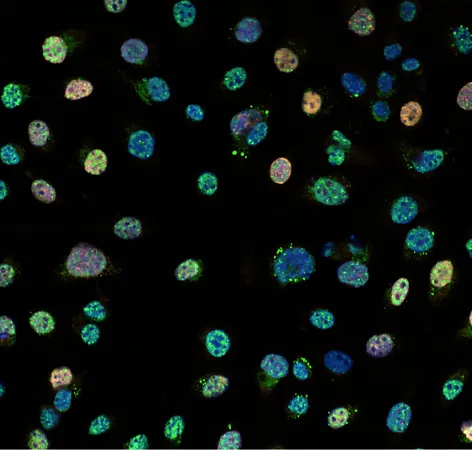
Revolutionary Blood Test Offers Hope for Ovarian Cancer Patients Facing Drug Resistance
2024-11-13
Author: Wei
Groundbreaking Discovery by WEHI Researchers
Researchers from the esteemed Walter and Eliza Hall Institute (WEHI) in Australia have made a groundbreaking breakthrough in the battle against ovarian cancer. They have discovered a novel method to identify patients who are likely to develop resistance to PARP inhibitors (PARPi), a crucial therapy employed to combat ovarian and breast cancers.
Published Study and Its Implications
In a study published in *Molecular Cancer*, the team utilized blood samples from patients to pinpoint a unique mechanism that leads to drug resistance in ovarian cancer cells. This finding has monumental implications, as it could enable early identification of patients who may not respond effectively to PARPi therapy, thus improving treatment outcomes.
Transforming Patient Care
The introduction of these findings into clinical practice promises to transform patient care, allowing medical professionals to conduct blood tests that can assess susceptibility to drug resistance. With over 1,700 women diagnosed with ovarian cancer and an additional 20,000 cases of breast cancer reported annually in Australia, this advancement holds the potential to significantly change the trajectory of treatment for these patients.
Challenges with PARP Inhibitors
PARP inhibitors have revolutionized the approach to treating cancers associated with DNA repair deficiencies like homologous recombination deficiency (HRD), particularly among those with BRCA1 or BRCA2 mutations. Despite their effectiveness, one of the most considerable challenges is that many patients ultimately experience a relapse due to the development of drug resistance.
Insights into Drug Resistance Mechanisms
The study reveals that certain genetic mutations, particularly in the BRCA1 gene, allow cancer cells to evade the effects of PARPi by utilizing a process called splicing. This discovery of how these cancer cells can 'bypass' the vulnerabilities targeted by the drug is a crucial advancement. By detecting DNA alterations linked to this splicing mechanism through a simple blood test, healthcare professionals can now start monitoring resistance in a subset of ovarian cancer patients.
Significance of the Findings
Co-first author Dr. Ksenija Nesic emphasized the significance of these findings, noting that they illuminate a previously overlooked area in cancer research. "We are hopeful that similar splicing mechanisms can be identified in BRCA2 and other genes related to HRD," she expressed. "This discovery not only enhances our understanding of drug resistance but also equips clinicians with the tools needed for better patient management."
Advancements in Personalized Medicine
Moreover, the identification of splicing changes marks a major step forward in the field of personalized medicine. According to senior co-author Associate Professor Matthew Wakefield, recognizing drug resistance early could enable clinicians to switch to alternative treatments more effectively. "This discovery empowers healthcare providers to make informed decisions and prolong patients' lives while ensuring better control over their cancer."
Collaborative Efforts in Cancer Research
The collaborative study also involves contributions from several notable cancer research institutions, including the Fox Chase Cancer Center and the Royal Women's Hospital. The research team analyzed samples contributed through the WEHI-Stafford Fox Rare Cancer program and a large-scale international clinical trial, illustrating a comprehensive approach to tackling this complex disease.
Future Directions in Research
Looking to the future, Professor Clare Scott, head of WEHI's Ovarian and Rare Cancer Laboratory, emphasized not just the importance of diagnosis but also the next steps: “We are eager to uncover ways to prevent drug resistance from occurring in the first place and explore therapeutic options that could enhance our arsenal against ovarian cancer. Our ultimate goal is to develop treatments that stop resistance in its tracks.”
Hope for Ovarian Cancer Patients
This discovery could indeed be a game-changer in the management of ovarian cancer, offering hope to countless women battling this challenging disease. With ongoing research and the promise of innovative therapies on the horizon, patients can look forward to a more personalized and effective treatment landscape.
Stay Tuned for Future Developments
Significant developments are on the way - could this be the breakthrough needed in the fight against ovarian cancer?

 Brasil (PT)
Brasil (PT)
 Canada (EN)
Canada (EN)
 Chile (ES)
Chile (ES)
 España (ES)
España (ES)
 France (FR)
France (FR)
 Hong Kong (EN)
Hong Kong (EN)
 Italia (IT)
Italia (IT)
 日本 (JA)
日本 (JA)
 Magyarország (HU)
Magyarország (HU)
 Norge (NO)
Norge (NO)
 Polska (PL)
Polska (PL)
 Schweiz (DE)
Schweiz (DE)
 Singapore (EN)
Singapore (EN)
 Sverige (SV)
Sverige (SV)
 Suomi (FI)
Suomi (FI)
 Türkiye (TR)
Türkiye (TR)